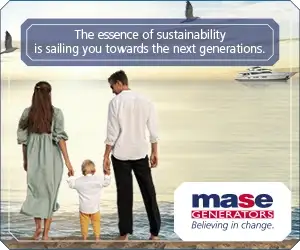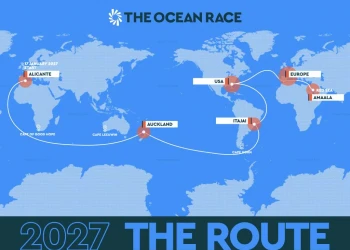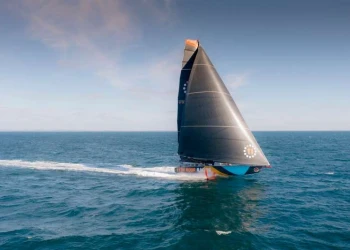
© Beau Outteridge/Turn the Tide on Plastic
Six ways The Ocean Race is fighting the plastic problem
This week could mark a major milestone in the fight against plastic pollution, as a meeting of global governments is providing an unprecedented opportunity to establish a global treaty that could spell the end for plastic entering the ocean.
While the decision-makers discuss the treaty at the United Nations Environment Assembly (UNEA 5.2) in Nairobi, Kenya, urgent action also needs to be ramped up by individuals, organisations and businesses. With plastic in the ocean set to triple by 2040 and the risk that there will be more plastic in the sea than fish by 2050 the pressure is on everyone to do their part and help stem the tide.
Here are six ways that The Ocean Race is working to turn off the plastic tap.
1. Pushing for plastic policy
The Ocean Race has joined businesses and civil society and indigenous communities to urge governments to get behind the ambitious Treaty being proposed at UNEA 5.2 and introduce legally-binding actions and obligations to prevent and address plastic pollution and its toxic impacts.
Cabo Verde, one of the host countries of The Ocean Race 2022-23, is a co-sponsor of this legally binding global agreement. The island nation joins 20 countries as co-sponsors, including the Race’s European stopovers. Cabo Verde’s decision to support the call for action at this high level follows the country’s renewed efforts to create a more sustainable future ahead of The Ocean Race visiting the country for the first time next January.
Prime Minister of Cabo Verde, José Ulisses de Pina Correia e Silva, said: “Curbing plastic waste is one of the most crucial mitigation strategies for the health of our oceans and our people. This treaty and its member states commitment to it will provide a substantial tool to protect our oceans from harmful plastic pollution. Cabo Verde is steadfast in its commitment to explore all options to reduce the plague of plastics in our waters.”
2. Cutting single-use plastic in Race Villages
No single-use plastic is used in The Ocean Race’s food and drink outlets and catering. All serviceware is reusable or compostable, straws are banned and water refill stations are provided throughout the Race Villages. During the last edition of the race 1 million single-use plastic items were avoided, including 380,000 plastic water bottles.
The Ocean Race is committed to supporting a circular economy for plastic (the sharing, reusing, repairing, refurbishing and recycling of materials and products for as long as possible). As a signatory of the Global Commitment, an initiative led by the Ellen MacArthur Foundation, in collaboration with the UN Environment Programme, The Ocean Race has committed to ambitious targets related to how the event uses and reuses plastic.
3. Helping to map plastic in the ocean

The Ocean Race equips teams with onboard scientific equipment to measure microplastics in the water as they race. In the 2017-18 edition of the Race microplastics were found in 93% of the samples, including at Point Nemo - the furthest point from land on the planet. Meanwhile, of the 36 water samples collected during The Ocean Race Europe last summer, all were found to contain microplastics, in particular microfibres (tiny plastic fibres from synthetic clothing and tyres). This was a significant and surprising discovery, as there has been limited research on microfibres in the ocean.
The data is provided to leading scientific organisations to analyse, including GEOMAR Helmholtz Centre for Ocean Research Kiel and Utrecht University, to help inform understanding of how microplastics enter the marine ecosystems and contribute to a map of plastic in the ocean.
4. Tackling the plastic problem together
To find solutions to the plastic crisis, and to create the scale of impact that is urgently needed, collaboration and knowledge sharing is vital. To help to accelerate action The Ocean Race is bringing together the events and sports sectors, alongside plastics and circularity experts for an Innovation Workshop this week to establish an agreed approach to plastic stewardship and footprint reporting.
Following previous workshops, which focused on the specific issue of single-use plastic in the branding and signs that dress an event, this week’s session will help the industry to understand the scale of their plastic use. Knowing how to measure an event’s plastic footprint is essential in order to reduce it. The Ocean Race will produce a how-to guide for the sector, with input gained from industry experts during the workshop. The Ocean Race has also previously released a guide to avoiding Single-Use Plastic at Sporting Events.
The Ocean Race is committed to balancing its unavoidable plastic footprint, and will discuss approaches to ‘plastic offsetting’ through supporting ocean-bound plastic collection projects at the workshop.
5. Working with partners who pass on plastic
Working with like minded partners who embrace sustainability and make every effort to reduce their plastic footprint is essential. Helly Hansen, the Official Clothing Supplier for The Ocean Race 2022-23 uses recycled materials in over 70% of their products, including recycled plastic that was ‘ocean-bound’. GAC Group, the parent company of GAC Pindar, the Official Logistics Partner of The Ocean Race, has introduced a global ban on the use of single-use plastics in their 300+ offices and their individual companies, such as GAC UK, are researching methods of eliminating single-use plastics from their supply chains.
Another company making strides is The Ocean Race’s Official Timing Partner, Swiss watch manufacturer Ulysse Nardin, who are researching and developing solutions for the growing plastic pollution crisis in the ocean and using recycled fishing nets, one of the main sources of ocean plastic pollution, in their products.
Premier Partner Volvo Cars has no single-use plastic in any of their premises or events and at the Race’s 2018 stopover in Gothenburg, they revealed their impressive ambition for 25% recycled plastics in every new car from 2025.
6. Inspiring children to take action
The Ocean Race is creating a new generation of ocean advocates, by helping children across the planet to understand the issues affecting our marine world. The Champions for the Sea Learning programme teaches children aged 6-12 about the problem of plastic in the ocean and what can be done to combat it. Launched in October 2017, it has taught over 190,000 children in more than 54 countries about this threat and inspired them to take care of our incredible blue planet.





